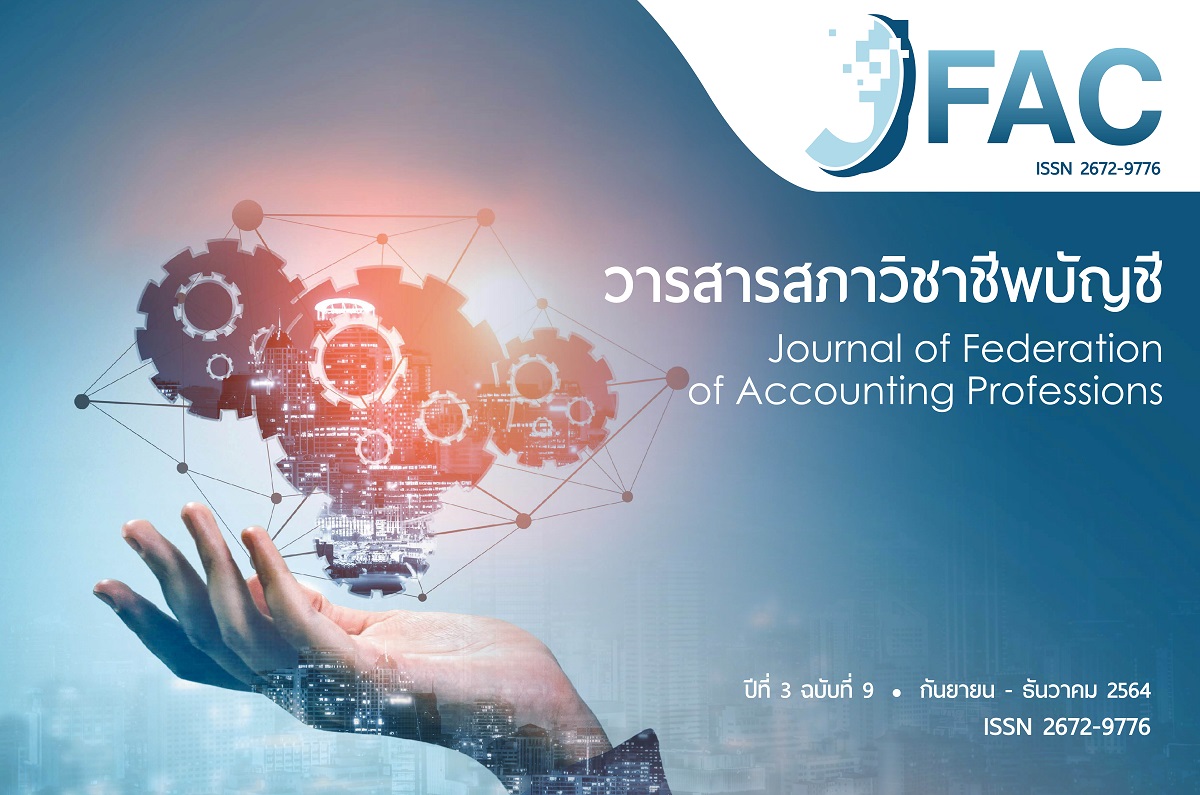แนวทางการพัฒนาคุณลักษณะของนักบัญชียุคดิจิทัลที่ส่งผลสัมฤทธิ์ต่อการปฏิบัติงานของนิติบุคคลในจังหวัดกาญจนบุรี
Main Article Content
บทคัดย่อ
การวิจัยนี้มีวัตถุประสงค์เพื่อวิเคราะห์ปัจจัยด้านคุณลักษณะของนักบัญชียุคดิจิทัลที่ส่งผลสัมฤทธิ์ต่อการปฏิบัติงาน และเพื่อจัดทำแนวทางการพัฒนาคุณลักษณะของนักบัญชียุคดิจิทัลที่ส่งผลสัมฤทธิ์ต่อการปฏิบัติงาน กลุ่มตัวอย่างคือ นิติบุคคลในจังหวัดกาญจนบุรี จำนวน 350 ตัวอย่าง เก็บรวบรวมข้อมูลจากแบบสอบถาม ใช้สถิติวิเคราะห์องค์ประกอบเชิงยืนยันและวิเคราะห์การถดถอยเชิงพหุคูณ ผลการวิจัย พบว่า 1) การตรวจสอบความสอดคล้องของโมเดลคุณลักษณะของนักบัญชียุคดิจิทัลที่ส่งผลต่อผลสัมฤทธิ์ต่อการปฏิบัติงาน พบว่า โมเดลมีความสอดคล้องกับข้อมูลเชิงประจักษ์ โดยมี Chi-square = 368.11 df = 399 p-value = 0.86 X2/df = 0.923 GFI = 0.93 AGFI = 0.92 และ RMSEA = 0.01 2) ผลการวิเคราะห์ปัจจัยด้านคุณลักษณะของนักบัญชียุคดิจิทัลที่ส่งผลสัมฤทธิ์ต่อการปฏิบัติงาน พบว่า ปัจจัยด้านจรรยาบรรณวิชาชีพบัญชี ด้านทักษะการใช้ภาษาอังกฤษ ด้านการคิดวิเคราะห์และการแก้ไขปัญหา และด้านเทคโนโลยีสารสนเทศ ส่งผลเชิงบวกต่อผลสัมฤทธิ์ต่อการปฏิบัติงาน อย่างมีนัยสำคัญทางสถิติที่ระดับ 0.05 3) ผลการวิเคราะห์แนวทางการพัฒนาคุณลักษณะของนักบัญชียุคดิจิทัลที่ส่งผลสัมฤทธิ์ต่อการปฏิบัติงาน พบว่า นักบัญชีควรมีการพัฒนาด้านเทคโนโลยีสารสนเทศ รู้จักใช้ประโยชน์จาก AI ก้าวทันทางเทคโนโลยี และนักบัญชีควรเปลี่ยนบทบาทใหม่มาอยู่ในฐานะที่ปรึกษาเป็นเพื่อคู่คิดของผู้บริหารสามารถคิดวิเคราะห์และการแก้ไขปัญหาได้ทันการณ์ รวมทั้งมีทักษะด้านการใช้ภาษาอังกฤษเป็นอย่างดี
Article Details
เนื้อหาและข้อมูลในบทความที่ลงตีพิมพ์ในวารสารสภาวิชาชีพบัญชี ถือเป็นข้อคิดเห็นและความรับผิดชอบของผู้เขียนบทความโดยตรงซึ่งกองบรรณาธิการวารสารไม่จำเป็นต้องเห็นด้วยหรือร่วมรับผิดชอบใด ๆ
บทความ ข้อมูล เนื้อหา รูปภาพ ฯลฯ ที่ได้รับการตีพิมพ์ในวารสารสภาวิชาชีพบัญชี ถือเป็นลิขสิทธิ์ของวารสารสภาวิชาชีพบัญชี หากบุคคลหรือหน่วยงานใดต้องการนำข้อมูลทั้งหมดหรือบางส่วนไปเผยแพร่ต่อหรือเพื่อกระทำการใดๆ จะต้องได้รับอนุญาตเป็นลายลักษณ์อักษรจากวารสารสภาวิชาชีพบัญชี ก่อนเท่านั้น
เอกสารอ้างอิง
Accountants. Journal of Business and Social Sciences, Ramkhamhaeng University, 3(1), 15-26.
Bunyawut, S., & Intakhan, P. (2016). The study of new generation characteristics of accountants
under the ASEAN community. Journal of Modern Management Science, 9(1), 167-177.
Cronbach, L. J. (1971). Essentials of phycholosical Testing Fourth Edition. New York. Haper & Row
Department of Business Development. (2020). Provincial juristic person registration statistics,
2020. Retrieved from https://datawarehouse.dbd.go.th/area/overview#
Federation of Accounting Professions. (2021). Accounting Professions Act, B.E. 2547. Retrieved
from https://www.tfac.or.th/Article/Detail/66888
Inthama. S. (2019). Opportunity to cross the original concept into a new world professional
digital accountant. Retrieved from https://www.tfac.or.th/Article/Detail/126279
Khrutboonyong, C. (2014). Desirable Characteristics of Accountant for Japanese Manufacturing
Companies in Thailand. Panyapiwat Journal, 6(1), 77-85.
Krejcie, R.V., & D.W. Morgan. (1970). Determinging Sample Size for Research Activities.
Educational and Psychological Measurement, 30(3), 607-610
Kokina, J., Gilleran, R., Blanchette, S., & Stoddard, D. (2020). Accountant as Digital Innovator:
Roles and Competencies in the Age of Automation. Accounting Horizons, 35(1) 153-184. Retrieved from https://meridian.allenpress.com/accounting-horizons/article-abstract/35/1/153/441714
Kongsat, S. & Thammawong, T. (2008). Determination of the Validity of the Questionnaire (IOC).
Retrieved from https://www.mcu.ac.th/article/detail/14329
Kuaket, P., Promtem, P. & Phaibunwetsawat, W. (2020). Relationship between Become a
professional accountant in the digital age and the performance of a limited partnership business. In Yala province. Journal of Accounting and Management, Mahasarakham University, 12 (1), 163-166.
Kumarn, S., & Kumarn, T. (2014) Preferable Characteristic of Accountants by Enterprises in Nan
Province. Journal of Humanities and Social Sciences, 6(12), 122-137.
Laksana, S. (2003). Development of work efficiency. (3rd edition) Bangkok: Thanarat Publication.
Likert, R. (1932). A technique for the measurement of attitudes. Archives of
Psychology. 22(140), 55.
McKinney, E., Yoos, C. J., & Snead, K. (2017). The need for ‘skeptical’ accountants in the era of
Big Data. Journal Accounting Education, 38, 63-80. Retrieved from https://www.sciencedirect.com/science/article/abs/pii/S0748575116301051
Pimta, L. & Srithonrach, B. (2019). Effects Accounting Ethics on Work Success of Companies
Accountants in the Roi Et Province. Burapha Journal of Business Management, 8(2), 119-141.
Pornpipatkul, W. (2020). Accountants Management in the Digital Age. Retrieved from
https://www.tfac.or.th/Article/Detail/126283
Prapaisri, P., & Numtapun, K. (2020). Professional Development Guidelines for Accounting
Professionals in the Digital Age. Journal of MCU Nakhondhat, 7(12), 421-435.
Rodjam, C. & Mungsing, R. (2019). A Confirmatory Factor Analysis of Accountants’ Competency in
Desirable Accountants’ Qualifications. Journal of Humanities and Social Sciences, Rajapruek University, 5(1), 29-44.
Santhachak, K., & Sukwattanasinitt, K. (2019). Factors Affecting working Efficiency of Digital
Accountants Working in Thai Government Offices. Hatyai Academic Journal, 17(1), 17-31.
Siripit, N., Manawakul, S., & Kamchuen, P. (2013). Factors Affecting the Readiness of Thai
Accountants with the Opening of the ASEAN Free Trade Area (AEC) Case Study of Accounting Firms Certified by Accounting Firms In accordance with the requirements for accounting firm quality certification in Bangkok. Retrieved from http://www.hu.ac.th.
Srisuk, N., & Sukwatanasinit, K. (2017). Modern Accounting Competencies on Rractice Sussess of
Bookkeepers in Nonthaburi and Bangkok Provinces. Proceeding of the National Academic Research Conference 7th (University Social Engagement as a Driving Force for Thailand 4.0): Rajabhat University, Nakhonratchasima.
Sukjai, S., & Penwutikun, P. (2019). Characteristics of the Accountants in Thailand 4.0 Thai Affect
Practice Success of Office of the Judiciary. Graduate School Conference 2019, Suan Sunandha Rajabhat University, 3(1), 444-449.
Upradit, A. (2018). The Relationship of Accounting Professional Ethics toward Performance of
Bookkeeper in Lampang Province. Journal of Faculty of Applied Arts, King Mongkut’s University of Technology North Bangkok, 11(1), 81-91.
Uyar, A., & Gungormuş, A. H. (2011). Professional knowledge and skills required for accounting
majors who intend to become auditors: Perceptions of external auditors. Retrieved from http://www.berjournal.com/wpcontent/plugins/downloads- manager/upload


